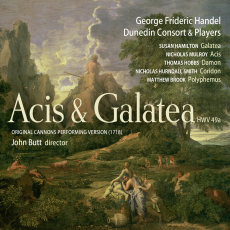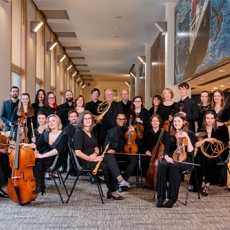Handel's Acis & Galatea - Dunedin Consort - Gramophone
Handel's Acis & Galatea has been recorded often, but the original version written for small-scale performance by only five singers (soprano, three tenors and bass) and a small band at Cannons in 1718 has almost never been properly revived owing to blind trust of poor editions, a preference for using composite (or compromised) versions, mucking about with the scoring, a desire to use full chorus, missing out the third tenor character, Coridon, or sheer uninterest in doing extra homework. This beggars belief because the Cannons version text makes more dramatic sense and the musical scale of it is charming. It is certainly among Handel's most perfect creations. Thankfully, John Butt has researched the performing conditions and text of the Cannons Acis. The philological aspects are impeccable, and, better still, the performance is utterly magical.
The Sinfonia brims with unforced personality, after which the pastoral chorus "O the pleasure of the plains" is relaxed, with the oboes given enough space to weave their initiative lines clearly. The five singers and the band are beautifully in proportion with each other, and Linn's sound recording is stunningly good. Susan Hamilton's light, articulate soprano is preferable to an operatic voice in the role of Galatea: her rendition of "Hush, ye pretty warbling choir" is notable for its affectionate delicacy, and she smoothly navigates the deceptively tricky leaps in "As when the dove". Nicholas Mulroy's Acis is resonant and suave, combining muscularity and elegance. In "Love in her eyes sits playing" the Dunedin Players sound as expansive and sonorous as any larger Baroque orchestra. The madrigal-like beauty of "Wretched lovers" is breathtaking: the blend and understanding between the five singers is deeply satisfying, and the menacing music to convey the arrival of Polyphemus is astutely integrated (the section "See what ample strides he takes" is magnificently measured). Matthew Brook's Polyphemus is extrovert, powerful and amusing, but also arouses pity and tenderness from the listener in "I rage, I melt, I burn". The dialogue between the hapless would-be seducer and the disgusted Galatea is superbly enacted by Brook and Hamilton. The roles of Damon (offering counsel to Acis) and Coridon (who advises Polyphemus to behave more gently) are admirably sung by Nicholas Hurndall Smith and Thomas Hobbs.
"The flocks shall leave the mountains" is slower than has become normal, but this better reveals its function as a tender love duet until the jealous Polyphemus can't bear in any more. Furthermore, it sets up an ideal dramatic context for a pathos-laden performance of Acis's death scene. The rapturous choral ensemble brings out the Purcellian quality in the unaccompanied final cadences of "Mourn all ye Muses", and Galatea's "Heart, the seat of soft delight" is sublimely shaped by the recorder-players and radiantly sung by Hamilton. Butt's direction from the harpsichord is a role model of taste and style, and he insightfully conveys the elusive changing tone of the story from pastoral romp into personal tragedy. Previous versions of merit still possess enduring appeal, but it seems to me that the Dunedins have transformed the way in which we can understand and enjoy Handel's lovely early English masterpiece.

